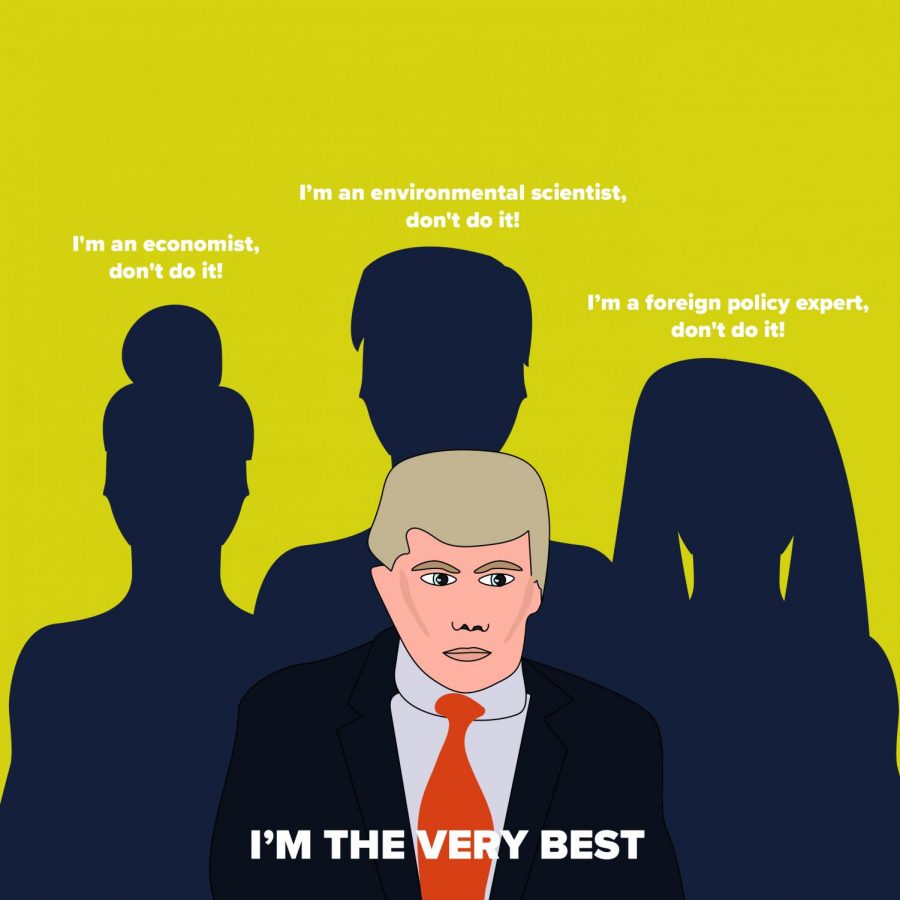Do great businessmen make great politicians?
Feb 4, 2019
Let’s assume Donald Trump truly is a great business person. There have been some reports against it, but ignore them for the sake of this argument. From there, Trump and his supporters will say he is a good president because they believe the rarely questioned assumption that being good at business equates to being good at politics.
The Trump campaign ran on a nontraditional idea of expertise. It went something like this: These so-called experts and elites have failed us, so pick me instead. I may not be an experienced politician or policy specialist, but I am a great business leader and deal-maker. The assumption made here is leadership in the boardroom and leadership in the oval office function in the same manner.
One of the best examples of Trump’s mentality is in his interview with conservative radio host Hugh Hewitt. During the discussion, he mixed up the Quds Force, an Iranian special operations unit, and the Kurds, an ethnic minority who have played an important role in the Syrian Civil War and the fight against ISIS. Defending his mistake, Trump said essentially it was a “gotcha question” and not in his area of expertise. He is, after all, a real estate developer, not a foreign policy analyst.
Later on in the same interview, after admitting he did not know the difference between Hezbollah and Hamas, Trump said, “Right at the day after the election, I’ll know more about it than you will ever know … and believe me, it won’t take me long.” To make up for his lack of current knowledge, he said, “I’m a delegator. I find great people. I find absolutely great people, and I’ll find them in our armed services, and I find absolutely great people.”
Trump’s confidence in using his leadership ability as a tool to overcome a lack of experience is the same confidence that plagued the Kennedy Administration. After winning the 1960 election, John F. Kennedy had to form his cabinet. One of his underlying philosophies in choosing people was similar to Trump’s: We do not need traditional experts, we need to find great leaders.
Get The Daily Illini in your inbox!
Kennedy also ran a nontraditional campaign. One of the young president’s campaign promises was to bring modern, scientific, business-style management into the government. He hired Robert McNamara, president of Ford Motor Company, as his Secretary of Defense. McNamara was one of the “whiz kids.” These were young business leaders who restructured Ford on the principles of mathematical modeling. He had also reached the rank of lieutenant colonel in World War II. Others included McGeorge Bundy, the youngest person to serve as the dean of Harvard and one of the greatest academics of his time.
These backstories are incredibly similar to many of Trump’s cabinet picks. Steven Bannon, the alt-right media mogul, Rex Tillerson, the successful CEO of ExxonMobil, and many of Trump’s other cabinet officials have come from Goldman Sachs.
While it may seem somewhat logical for a businessperson to make macroeconomic decisions, Austrian-school economist Chris Calton explains it best as, “The reason that the right is particularly prone to the fallacy that the businessman is likely to be more economically knowledgeable is because they equate something that is good for business with something being good for the economy as a whole (this can be recognized as the ‘Fallacy of Composition’).”
The same can be applied for a general leading the Department of Defense or Ben Carson, who lived in low-income housing, now managing the entirety of America’s low-income housing.
Currently, Trump’s cabinet has the highest turnover rate in modern history, which should speak to its own effectiveness. But the Kennedy administration is a good point of reference to see what happens in the long run with politicians and specialists being replaced by people who only have a more general business or leadership background.
The Kennedy Cabinet’s biggest conundrum was the escalating conflict in Vietnam. No matter how badly the war was going, its officials were usually optimistic. McNamara would justify this belief with his statistics: The North Vietnamese were losing soldiers much faster than the American forces. Plus, the U.S. had more bombs, planes and ships, so how could the U.S. lose? His main metric of success was Vietnamese casualties, but he failed to see past the numbers.
McNamara, like the rest of his cabinet, had little qualitative insight into Vietnam. JFK’s officials did not understand the way American forces were seen as the continuation of France’s colonial legacy, why South Vietnamese government policies were leading its own citizens to fight against it or how Ho Chi Minh, the leader of North Vietnam, correctly prophesied, “You can kill 10 of my men for every one I kill of yours. But even at those odds, you will lose.”
The Kennedy Administration did have expert bureaucrats in the State Department, but it consistently ignored them in favor of its own belief in the power of scientific management and leadership. This story again repeats itself in the way Trump has been ignoring the experts in Foggy Bottom, Washington D.C.
None of this is to say business or leadership skills are useless. But the idea business and politics work the same way or that this vague notion leadership can be taken out of its original context and succeed in any new field is an oversimplification that has hurt us before and is hurting as again. Leadership means different things in different places.
There are also good reasons to be upset at the experts. The foreign policy establishment’s backing of the Iraq War is a good example, but the pendulum has swung too far in the opposite direction, handing positions of power over to incompetent people.
Joseph is a junior in LAS.






